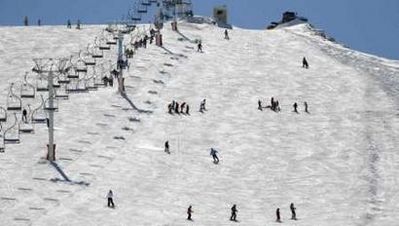 Adam Mynott found quiet pistes, friendly locals and great cuisine, Risk-averse skiers; surely an oxymoron? But no, they must exist
Adam Mynott found quiet pistes, friendly locals and great cuisine, Risk-averse skiers; surely an oxymoron? But no, they must exist
Hotel Merab is a family-run lodging: clean and friendly, if slightly disorganised. But it shed its modest aspirations for the skier’s most important meal of the day. Breakfast was a sumptuous Franco-Lebanese feast including aromatic, sesame-encrusted, thyme-infused manoushe (unleavened bread), mounds of velvety labne (yoghurt) topped with olive oil, tomatoes, baby cucumbers and olives, plus a delicious legacy of French rule: croissants and pains-au-chocolat to rival anything Paris has to offer.
Kitted out within minutes at the ski-hire shop, and our lift passes issued with breathtaking ease, we were standing on the slopes just half an hour after breakfast. Squinting at the pistes as we smeared on factor 60, we began to wonder where everyone had gone. It was 9.30am on a Saturday, under a cloudless sky, and the slopes were all but deserted.
Abilities in our family of five ranged from absolute novice through cautious to over-confident, and we pored over the piste map, picking out long, green slopes at one end and precipitous reds and blacks at the other. The Kfardebian ski area is spread over three domaines with 80km of marked slopes and unlimited off-piste possibilities.
The base of the resort is 1,850m high and it climbs up another 600m to the Dôme du Mzaar, where you get wonderful views of the Bekaa Valley away to the north-east, and below to the west, Beirut and the Mediterranean Sea.
We stripped off a layer and stamped our boots into the ski-bindings. By now, a handful of Lebanese weekend skiers had begun to arrive. We slithered off towards the first drag lift. There is something exotically heady about skiing these sparkling, pristine white dunes under a Middle Eastern sun to the muted background babble of Arabic.
That sense of having pitched up as new members in an unwelcoming and somewhat elitist club, which puts so many late-starters off skiing, is entirely absent. We met a group of retired teachers from Larnaca in tracksuits and anoraks, a couple of Red Cross Workers who had come up for the weekend from Cairo and three immaculately dressed Greek gods on snowboards, whose Olympian dignity deserted them as soon as they tried to move forward.
The snow was deep and crisp, and brilliantly organised. We must have had more than half a metre of fresh snowfall during the week and most of it fell at night. One of the lift attendants told me that in the evening, warm, wet air blows in off the Mediterranean and is shoved rapidly to icy heights above 1,800m, where it sheds its watery load in large, crisp snowflakes. Off-piste skiing in Mzaar must rival anything else on the planet. From the top of the Dôme, vast fields of undulating powder stretch away into the distance.
When you’re not queuing, it’s amazing how much more you ski and, consequently, improve. While sitting on a chair-lift, I worked out that if you take 12 lifts a day, and queue, typically in the Alps, for 10 minutes each time, that’s two hours of skiing lost every day. There was none of that in Mzaar, and none of the core-numbing chill as the sun drops behind the mountain and sodden gloves, and fingers inside them, start to stiffen.
We fell into the routine of stopping on the way back from the slopes at one of a handful of cafés for chocobas, a blood-sugar restoring concoction of hot baguette filled with melted chocolate and sliced banana. Sometimes we’d succumb to the "nut man" who would stop his old estate-car in front of us and open up his boot crammed with a fragrant, treasure trove of almonds, dates and mint-green and rose pistachios.
It’s possible here to ski in the morning and take a dip in the Med in the afternoon. But we never did. Six hours of solid skiing left us fit for nothing more strenuous than a walk to the nearest restaurant. Eating out was a joy, enhanced by the reckless consumption of one of Lebanon’s principal exports, wine from the Bekaa Valley.
Lebanese food is not, like its ski resorts, a well-kept secret; it is an international flag of honour. Determination to eat Lebanese led us twice to the Xtreme Food café, whose name belied the delicacy of the hummus, manoushe, chicken touk and baklava. One evening we took a taxi in search of authentic Lebanese food and atmosphere to Shekar’s in Fakra, the next village down the valley. After a feast of fatoush, kofta and baba ghanoush our young waiter, Gabrienoush, sat down with us and, with a mournful expression, told us how he was in despair at the state of the country, at the gulf between the rich and the poor, and how, as soon as he’d saved enough money, he would be joining the Lebanese diaspora. Before we left, he insisted on summoning the owner, who wouldn’t let us leave until we’d joined him in a glass of arrack – Lebanon’s answer to pastis. The bill was less than £25 for an exquisite meal for five.
We came away from Mzaar resolved to return next year, but while we congratulated ourselves on our adventurous spirit, putting down a deposit on one of the newly built chalets in the village might just be a step too far.



